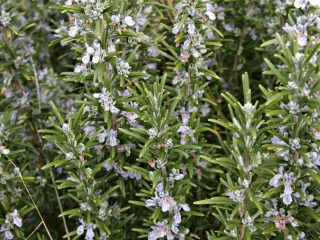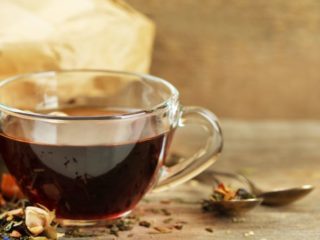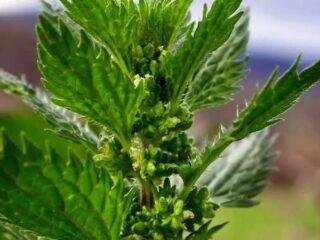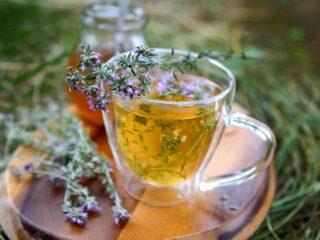Content
- 1 Can I drink sage instead of tea?
- 2 The taste of tea with sage
- 3 Benefits of sage tea
- 4 Is it possible to give sage tea to a child?
- 5 Can pregnant women have tea with sage?
- 6 Sage tea for breastfeeding
- 7 How to brew sage for tea
- 8 How to drink sage tea
- 9 Contraindications and harm
- 10 Conclusion
- 11 Reviews of sage tea
You can use sage in tea, but only within certain limits and not on an ongoing basis. The standard course of treatment lasts several weeks, maximum one month. If you drink the drink constantly, for example, for six months, harmful consequences may appear.
Can I drink sage instead of tea?
The use of sage as a medicinal tea has been known for a long time, since it is a common herb well known in folk medicine. It has antimicrobial, anti-inflammatory effects, and also has many other beneficial properties. As a rule, the plant is used as an adjuvant for the treatment of various diseases.
At the same time, the composition of sage is very rich; it contains quite a lot of tannins, organic acids and other compounds that are biologically active. Therefore, the properties of sage and its effect on the human body are much stronger than in ordinary tea.
You need to understand that the dosage of medicinal plants is not very large. For example, it is enough to take a tablespoon of chopped sage per glass of boiling water. The instructions indicate that the infusion is taken in short courses of up to 2-4 weeks. After this, be sure to take a break for at least ten days, and then repeat the cycle, but only if necessary.
Another limitation is due to the fact that herbal tea is taken only 2-3 times a day and no more. Moreover, it is best to drink sage before meals, while traditional tea is usually drunk after this or as an independent snack.
Thus, we can definitely say that sage cannot be a tea substitute in the usual sense. Those. It is not allowed to constantly use it for many months, much less years. The same rule applies to any medicinal herb. Moreover, even classic black or green tea can have harmful effects if drunk in large quantities.
The taste of tea with sage
Tea with sage has a rather noticeable spicy taste with a slight bitterness. The reason is that it contains, among other substances, essential oils. They imbue the drink with an interesting taste and aroma. The smell remains herbaceous, without fragrant floral notes. Therefore, tea, sugar or other products are often added to improve the taste.

Externally, the drink resembles green tea
The color is golden, with a greenish tint. The drink is completely transparent, not cloudy, reminiscent of green tea.To get the maximum benefit, it is recommended to infuse it under the lid for at least 15 minutes or prepare the decoction in a water bath for 20 minutes (from the start of boiling).
Benefits of sage tea
Sage tea helps with many diseases, and it is usually used as an additional therapy. The benefits of this drink are associated with its rich chemical composition:
- Cineole is a substance that stimulates the release of sputum when coughing and also destroys pathogenic bacteria.
- Borneol.
- Thujon.
- Ursolic acid – increases blood flow, regulates glucose levels, reduces cholesterol.
- Oleic acid – tones the body, helps to feel cheerful.
- Tea contains quite a lot of tannins, which act as an anti-inflammatory and analgesic.
- Linolenic acid - acts similar to oleic acid.
- Uvaol is a substance in sage tea with pronounced anti-inflammatory and diuretic properties.
- Salvin – has an antibacterial effect.
- Chlorogenic acid – blocks dangerous free radicals, prevents the development of cancer.
- Flavonoids.
- Vitamins A, PP, E, K.
- Alkaloids.
- Camphor.
If you add even a little sage to tea, it will strengthen the body and have a positive effect on various systems:
- Both decoction and tablets, as well as lozenges, help cope with inflammatory processes in the throat. The herb is used to treat colds and other viral infections. Sage tea is especially good for coughs because it helps remove phlegm.
- The components of the leaves and stems have a positive effect on the nervous system, especially the brain.Sage reduces anxiety, improves mood, and helps to better concentrate on the task at hand.
- The substances have a pronounced anti-inflammatory, analgesic and calming effect.
- Sage tea is also intended to treat diseases of the digestive system, such as gastritis or ulcers.
- The drink helps you feel more energetic, improves your condition when you experience a loss of strength or fatigue.
- The product is also used to treat stomatitis, gingivitis and other inflammatory pathologies of the oral cavity.

Tea has anti-inflammatory and soothing properties
Sage tea for women
The benefits of sage tea for women are associated with a fairly large number of substances that have antioxidant properties. This drink improves mood and reduces irritability, and also counteracts early aging processes and strengthens hair.
The herb contains phytoestrogens, which have a similar chemical nature to estradiol. Thanks to this, it is possible to quickly restore normal hormonal levels during menopause or as a result of ovarian dysfunction. The infusion can also be used to treat pathologies such as:
- candidiasis;
- herpes;
- cystitis;
- pyelonephritis.
Sage tea for men
The drink also benefits men. It improves overall well-being, strengthens the immune system and increases stamina. There is evidence that sage increases potency and helps to properly prepare the body for conception. Regular consumption of tea can improve the condition of the following diseases:
- baldness;
- caries;
- infertility;
- congestion in the testicles.
Is it possible to give sage tea to a child?
This drink is especially beneficial for a child during the treatment of colds, coughs, and inflammatory diseases of the oral cavity, such as stomatitis. But it should also be used to prevent respiratory infections, as well as to strengthen the immune system and improve metabolic processes.
Sage should not be given to children under the age of five inclusive. Only in extreme cases can it be used as a gargle, but only in consultation with a doctor. The drink can only be taken on a regular basis from the age of 12, but only after consultation with a specialist.
Can pregnant women have tea with sage?
As for cases of pregnancy, the situation here is clear. The use of sage in the form of tea, infusion, lozenges and any other forms is prohibited.
Sage tea for breastfeeding
The herb should not be used while breastfeeding. This practice can lead to allergic reactions, not only in the mother, but also in the child. As a last resort, external use of the decoction in the form of compresses or rinsing is allowed. But it is better to consult a doctor first.
How to brew sage for tea
Brewing tea is quite simple - place a tablespoon of raw material in a glass of boiling water and leave it covered for 30 minutes. Then filter and bring with cold boiled water to the original volume.

To achieve the desired effect, brew the drink for at least 30 minutes.
You can also prepare a sage decoction. The herb is taken in the same quantity, but poured with cold water, and then brought to boiling water and then cooked over very low heat for 20 minutes. Cover with a lid, leave until completely cooled and filter, then bring to the original volume.
With other herbs
Very often, sage is used in combination with other herbs. To prepare healthy tea, you can purchase a ready-made collection, which includes the following crops:
- eucalyptus;
- elecampane;
- peppermint;
- nettle;
- thyme;
- oregano;
- licorice.
Attention! Since each herb contains many biologically active substances, you need to take the collection according to the instructions.
As a rule, it is enough to put 1 teaspoon of raw material per glass of water.
How to drink sage tea
Take a third or a quarter of a glass of tea 3-4 times a day. It is better to do this 30 minutes before meals. Since sage tea is not stored for a long time, it should be consumed one, maximum two days in advance (in this case, put the glass in the refrigerator).
As a rule, the decoction is consumed in its pure form, i.e. without adding additional components. But if you drink it as tea, it is perfectly acceptable to use honey, sugar, jam or other ingredients.
Contraindications and harm
Uncontrolled use of sage in the form of tea can lead to indigestion, unstable stools, and allergic reactions.
It is also worth remembering that in some cases the use of this drink is contraindicated:
- pathology of the pancreas;
- pregnancy;
- feeding period;
- kidney disease;
- age up to five years inclusive;
- any individual intolerance, allergy.

In some cases, sage should not be used
Conclusion
Sage in tea is quite useful and appropriate, especially during the treatment of a cold. The herb is suitable for the prevention of respiratory infections. But you need to take into account that no one, even relatively healthy people, should use medicinal plants on a regular basis. The course of treatment lasts no more than four weeks.
Reviews of sage tea








